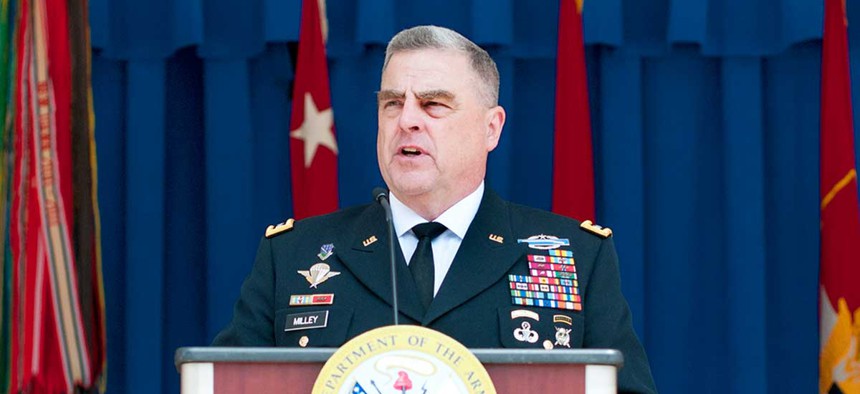
Army Chief of Staff Gen. Mark A. Milley speaking in 2017. Daniel Torok/Army
Analysis: Why Military Chiefs Are Condemning White Supremacy
The U.S. Armed Forces have had troubles with extremists enlisting in the past, and they don’t want it to happen again.
Since the president of the United States cast his lot in with white supremacists in his #NotAllNazis moment this week, the nation’s military service chiefs have responded with full-throated statements rejecting extremism and intolerance.
These statements have alarmed many. “If we lived in a different sort of country,” Fred Kaplan wrote in Slate, “this could fairly be seen as the prelude to a military coup.”
And I have some sympathy for this alarm.
As I have written in these pages, I am growing increasingly worried about the politicization of our military. And when I see the military appear to resist the impulses or tweeted policy preferences of the president, I am very conscious that—to build on an astute observation made by my friend Erin Simpson early on in this administration—some of the actions that protect the fabric of American society in the near term could be detrimental to American institutions in the long term. A politicized military that endures beyond this administration, for example, is not in the interests of the American people.
But I’m not as worried by the statements I’ve seen from the service chiefs, because I know there are two other important—and more parochial—motivations leading them to speak out against intolerance and hate groups.
The first motivation is that the U.S. military has long struggled with hate groups—and specifically white supremacists—in its ranks. White supremacist groups and their sympathizers were especially present in the ranks of the U.S. Army’s combat arms units and the U.S. Marine Corps in the 1980s and 1990s.
In 1986, an exasperated Secretary of Defense, Caspar Weinberger, ordered the military to crack down on these groups, and another purge was ordered after U.S. Army veteran Timothy McVeigh planted a bomb that almost leveled the Oklahoma City federal building in 1995, killing 168 people. 1995 was the same year a paratrooper from the Army’s 82d Airborne Division murdered a black couple outside Fort Bragg.
When I arrived in my first infantry unit in 2000, I remember encountering non-commissioned officers who were by then quite adept at interpreting the tattoos on the young white men arriving to the unit fresh from basic infantry training. By that point, though, recruiters were already weeding out most of the men who showed up with any sign of affiliations with white supremacist groups.
By the time I arrived at the elite 75th Ranger Regiment in 2002, meanwhile, the command sergeant major—the senior enlisted man in the regiment—was black, a regimental first. He had the respect of the entire regiment for two reasons: his rank, naturally, but also the toughness he displayed while rising through the ranks at a time when, in the 1980s, African Americans were decidedly unwelcome in certain quarters of the special operations community.
The military’s service chiefs are among the last men in the U.S. military who still remember those bad old days in the 1980s and 1990s. They are proud of the way they have largely purged the ranks of extremists and want to keep it that way. It was no surprise that the commandant of the Marine Corps was the first service chief to say something, as his service has arguably struggled with white supremacist groups—and diversity more broadly—more than the other services. Besides, when the service chiefs made their statements this week, they were merely affirming—for the nation and for the men and women in their ranks—existing policy.
The second motivation behind the statements from the service chiefs is the same motivation that led so many corporate leaders to abandon the president this week. As The Wall Street Journal correctly noted, “business leaders are risk-averse. They prioritize stability and the status quo. What has changed is the definition of the status quo.”
The modern U.S. corporation is far ahead of Trump’s base when it comes to progressive social values. All of these corporations actively promote an environment of multicultural liberalism. They have to. If corporations want to attract the best and brightest young American workers, they need to be seen as being friendly toward gays, lesbians, and transgender people. They need to be seen as welcoming toward religious and ethnic minorities. Why? Because this is the expectation of the younger Americans entering the workforce, regardless of their own personal ethnic or gender identity.
This is the same problem facing the service chiefs. Yes, the men and women who enter the military can be slightly more conservative than those entering the workforce out of university, but remember: Unlike corporations, the U.S. military only recruits young people. The kids joining the military today—and most of them are still teenagers—have grown up in precisely the America that scares white supremacists. They simply can’t imagine a public institution, for example, hostile to homosexuals or people of color.
So the military service chiefs have to create some distance between their institutions and the idiots in Charlottesville carrying semi-automatic carbines and wearing body armor, playing soldier. The military is in an annual competition for able-bodied young men and women willing to sacrifice their lives in the service of their country.
And, as we have seen, it’s a competition in which white supremacists need not apply.






